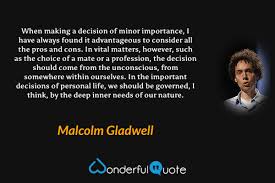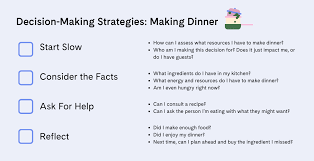Making Big Decisions: A Guide to Navigating Life’s Crossroads
Life is full of decisions, both big and small. But it’s the big decisions that often leave us feeling overwhelmed, uncertain, and even fearful. Whether it’s choosing a career path, starting a family, moving to a new city, or making any other life-altering choice, the weight of these decisions can be immense. However, with the right mindset and approach, navigating these crossroads can become an empowering and transformative experience.
The first step in making big decisions is to recognize their significance. Understand that these choices have the potential to shape your life in profound ways. Embrace this realization as an opportunity for growth and self-discovery rather than succumbing to anxiety or doubt.
Next, gather information. Educate yourself about the options available to you. Research different paths, seek advice from trusted sources such as mentors or experts in the field, and explore various perspectives. The more knowledge you acquire, the better equipped you’ll be to make an informed decision.
However, don’t get stuck in analysis paralysis. While research is crucial, remember that there will never be a perfect answer or an absolute guarantee of success. At some point, you must trust your instincts and take action. Consider your values, passions, and long-term goals when weighing your options.
It’s important to acknowledge that big decisions often come with risks and uncertainties. Embrace this reality as an inherent part of growth and personal development. Instead of fearing failure or setbacks, view them as valuable learning experiences that can lead to resilience and wisdom.
Seek support from those around you during this process. Share your thoughts and concerns with trusted friends or family members who can offer different perspectives or provide emotional support. Sometimes talking through your options out loud can help clarify your thoughts.
Remember that making a big decision doesn’t mean you’re locked into it forever. Life is fluid; circumstances change, and so do our priorities. Be open to reevaluating your choices along the way and making adjustments if necessary. Flexibility and adaptability are key to navigating the ever-changing landscape of life.
Lastly, trust yourself. Believe in your ability to make sound decisions and have confidence in your own judgment. Trust that you have the resilience and resourcefulness to handle whatever challenges may arise as a result of your choices.
Making big decisions can be daunting, but it’s also an opportunity for growth, self-discovery, and creating a life that aligns with your values and aspirations. Embrace the process, gather information, trust yourself, seek support when needed, and remember that even if things don’t go exactly as planned, you have the power to adapt and thrive.
5 Essential Tips for Making Big Decisions
Take your time
Take Your Time: The Power of Patience in Making Big Decisions
In a fast-paced world where instant gratification is often the norm, taking your time may seem counterintuitive. However, when it comes to making big decisions, giving yourself the gift of patience can be incredibly powerful.
Rushing into a major life choice without careful consideration can lead to regrets and missed opportunities. Taking your time allows you to thoroughly explore all aspects of the decision, weigh the pros and cons, and gain clarity about what truly matters to you.
When faced with a significant decision, resist the urge to make an impulsive choice. Instead, give yourself permission to step back and create space for reflection. Take the time to gather information, seek advice from trusted sources, and consider various perspectives.
By slowing down and allowing yourself ample time for contemplation, you give your mind the opportunity to process information more effectively. This can lead to a deeper understanding of your own desires, values, and priorities.
Taking your time also helps alleviate the pressure that often accompanies big decisions. It allows you to detach from external expectations or societal pressures and focus on what truly resonates with you. This sense of freedom empowers you to make choices that align with your authentic self.
Moreover, taking your time enables you to explore alternatives or creative solutions that may not have been apparent initially. It opens up space for innovative thinking and encourages a more comprehensive evaluation of potential options.
However, it’s important not to confuse taking your time with procrastination or indecisiveness. Set reasonable deadlines for yourself and establish a timeline that ensures progress without rushing the process. Find a balance between giving yourself ample time for thoughtful consideration while still moving forward towards resolution.
Remember that big decisions often have long-lasting consequences. By embracing patience in this journey, you demonstrate self-respect and self-care by prioritizing thoroughness over haste.
So next time you find yourself facing a significant choice, resist the urge to rush. Embrace the power of patience and allow yourself the time and space needed to make a well-informed decision. Trust that by taking your time, you are setting yourself up for a more fulfilling and purposeful path forward.
Consider all angles
When faced with a big decision, it’s crucial to consider all angles before making a choice. Taking the time to carefully evaluate the various perspectives and potential outcomes can lead to a more informed and balanced decision-making process.
Considering all angles means looking beyond our initial biases, preferences, or immediate desires. It involves stepping back and objectively examining the situation from different viewpoints. This approach allows us to gain a deeper understanding of the potential consequences and implications of our choices.
One way to consider all angles is by seeking input from others. Engage in open and honest discussions with trusted friends, family members, or mentors who can provide valuable insights and alternative viewpoints. Their perspectives may shed light on aspects that we might have overlooked or not fully understood.
Additionally, conducting thorough research can help us gather information from reliable sources. Explore different resources, such as books, articles, or online platforms, to gain diverse perspectives on the matter at hand. This research will equip us with valuable knowledge that can inform our decision-making process.
Another aspect of considering all angles is reflecting on our own values, goals, and priorities. Take some time for introspection and evaluate how each option aligns with your personal aspirations and long-term vision for your life. Consider the potential impact on your relationships, career trajectory, financial stability, and overall well-being.
However, it’s important not to get lost in overthinking or analysis paralysis. While it’s essential to gather information and consider different viewpoints, there comes a point where we must trust ourselves and make a decision. Strive for balance between thoughtful consideration and taking action.
In summary, considering all angles before making a big decision allows us to make more informed choices that align with our values and aspirations. Seek input from others, conduct thorough research, reflect on personal goals, but also remember the importance of trusting yourself in the decision-making process. By embracing this approach, you’ll be better equipped to navigate life’s crossroads and make choices that lead to personal growth and fulfillment.
Get advice
When faced with a big decision, one of the most valuable resources at your disposal is the advice of others. Seeking guidance from trusted individuals can provide fresh perspectives, insights, and valuable information that can help shape your decision-making process.
Getting advice is not about relying solely on someone else’s opinion or letting them make the decision for you. It’s about gathering different viewpoints and considering alternative possibilities that you may not have thought of on your own.
Start by identifying people in your life who have relevant expertise or experience in the area you’re grappling with. These could be mentors, friends, family members, or professionals in the field. Reach out to them and explain your situation, being clear about what kind of advice or insights you are seeking.
When seeking advice, it’s important to be open-minded and receptive to different perspectives. Listen actively and ask questions to gain a deeper understanding of their viewpoints. Remember that their advice is just one piece of the puzzle and should be considered alongside other factors such as your own intuition and values.
It’s also crucial to consider the credibility and reliability of the sources you seek advice from. While well-intentioned friends or family members may offer support, seeking input from experts or professionals in the field can provide more specialized knowledge and insights.
However, ultimately, the decision remains yours to make. Use the advice you receive as a tool for informed decision-making rather than blindly following someone else’s guidance. Consider how each perspective aligns with your own values, goals, and unique circumstances.
Additionally, remember that not all advice will be applicable or resonate with you. Trust your instincts and discern which pieces of advice feel most relevant and helpful in light of your situation.
Seeking advice can help broaden your understanding of a situation, challenge assumptions, and shed light on potential blind spots. It can provide clarity when faced with complex choices or uncertainties. By gathering diverse opinions and insights from trusted sources, you empower yourself to make a more well-rounded and informed decision.
However, it’s essential to strike a balance between seeking advice and maintaining agency over your own choices. Ultimately, the decision is yours to make, and by combining external guidance with self-reflection, you can navigate big decisions with greater confidence and clarity.
Make a plan
One crucial tip when facing a big decision is to make a plan. While it may seem obvious, taking the time to create a structured roadmap can significantly enhance your decision-making process.
When you’re confronted with a significant choice, it’s easy to feel overwhelmed and unsure of where to start. Making a plan helps bring clarity and structure to the decision-making process. It allows you to break down the decision into manageable steps, making it less daunting and more approachable.
Begin by clearly defining your goal or desired outcome. What do you hope to achieve with this decision? By setting a specific objective, you create a focal point for your planning process.
Next, identify the options available to you. Research and gather information about each alternative, weighing their pros and cons. Consider factors such as feasibility, potential risks, and alignment with your values and long-term goals.
Once you have a clear understanding of your options, outline the steps needed to evaluate each one thoroughly. This may involve conducting further research, seeking expert advice or opinions, or even conducting experiments or trials if applicable.
As you progress through your plan, consider creating a timeline or deadline for making the final decision. This will help prevent analysis paralysis and ensure that you move forward in a timely manner.
Additionally, consider involving others in your planning process. Seek input from trusted friends, family members, or mentors who can offer different perspectives or insights that may help inform your decision-making.
Remember that making a plan doesn’t guarantee that everything will go exactly as anticipated. Life is unpredictable, and circumstances may change along the way. However, having a plan provides structure and direction during times of uncertainty.
By making a plan for big decisions, you take an active role in shaping your future rather than passively waiting for things to happen. It empowers you with clarity and confidence as you navigate through the complexities of decision-making.
So next time you find yourself facing an important choice in life, take a step back, gather your thoughts, and make a plan. It will serve as your guiding light, helping you make informed decisions that align with your aspirations and lead you towards a fulfilling and purposeful life.
Trust yourself
Trusting Yourself: The Key to Making Big Decisions
When faced with big decisions in life, it’s easy to doubt ourselves and seek validation from others. However, one of the most important tips to remember is to trust yourself. Deep down, you possess an innate wisdom that can guide you towards the right path.
Trusting yourself means having confidence in your abilities, intuition, and judgment. It involves acknowledging your experiences, skills, and unique perspective that have shaped who you are today. Remember that you have overcome challenges before and have the strength to face new ones.
In a world filled with opinions and advice from others, it’s crucial to listen to your inner voice. While seeking guidance from trusted mentors or loved ones can be helpful, ultimately, you are the one who knows yourself best. Only you can truly understand your desires, values, and aspirations.
Trusting yourself doesn’t mean ignoring facts or dismissing logical reasoning. It means integrating both rational thinking and intuition into your decision-making process. Analyze the information available to you but also pay attention to how different options align with your values and resonate with your gut feeling.
Fear of making mistakes or facing failure often hinders our ability to trust ourselves. However, it’s important to recognize that setbacks are a natural part of life’s journey. Embrace them as opportunities for growth and learning rather than reasons for self-doubt.
Building self-trust takes practice and patience. Start by acknowledging past successes and decisions that turned out well. Celebrate those moments when you trusted yourself and things worked out in your favor. This positive reinforcement will help strengthen your belief in your own judgment.
Remember that no one has all the answers or a foolproof roadmap for success in life. Each person’s journey is unique, and what may work for someone else might not be the right path for you. Trusting yourself allows you to honor your individuality and make choices that align with your authentic self.
So, the next time you find yourself facing a big decision, take a deep breath, quiet the noise around you, and listen to your inner voice. Trust that you have the wisdom and resilience to make the best choice for yourself. Embrace the power of self-trust and watch as it transforms your decision-making process and empowers you to create a life that truly reflects who you are.



